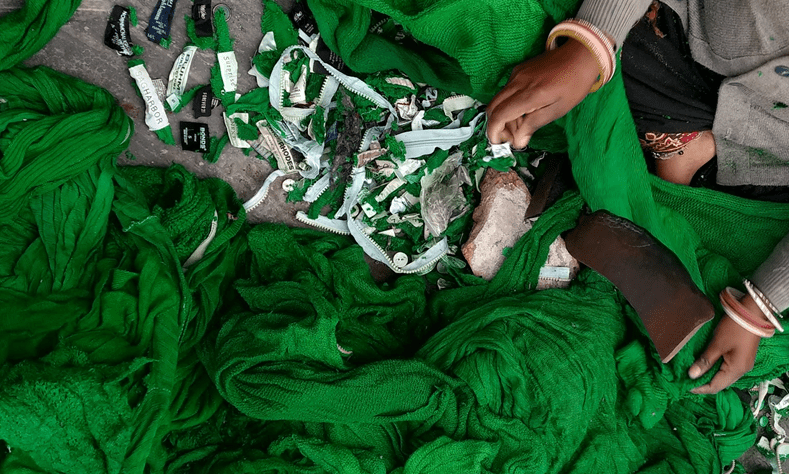MUMBAI – Today, Fashion for Good launches the Sorting For Circularity India Project, a consortium project to understand both the pre-consumer and post-consumer textile waste streams in India, and to pilot sorting and mapping solutions. The project aims to build an infrastructure towards greater circularity in the years to come.
The project brings together industry players including Fashion for Good partners adidas, Levi Strauss & Co., PVH Corp., Arvind Limited, Birla Cellulose and Welspun India. A key technology partner for the project is Fashion for Good innovator Reverse Resources who provides the analysis of the pre-consumer textile waste streams in addition to designing and running the pre-consumer pilot. The project is supported through catalytic funding provided by Laudes Foundation.
A COMPLEX TEXTILE LANDSCAPE
India’s position as a manufacturing and consumption market of textiles provides for large streams of pre-consumer as well as domestic post-consumer waste. Pre-consumer waste is only partially recycled, with the remaining portion mostly downcycled to products of inferior quality. Domestic post-consumer waste on the other hand is exceptionally difficult to trace, with limited data available to understand the waste, quantities, composition, and other factors key to its recycling. India is also one of the largest recipients of global post-consumer textile waste, with millions of tonnes, to the value of more than €100m[1], of discarded textile imported and manually sorted through various hubs. Similar to domestic waste, limited information on this imported waste exists.
In addition to the lack of accurate information, no technologies currently exist that organize, categorise and sort materials to ensure quality textile waste is accessible for recyclers, who require sorted feedstocks in large volumes. While these are not the only challenges faced by recyclers, they are significant barriers to the growth of chemical recycling technologies in India.

BUILDING A NEW STRUCTURE TO SCALE TEXTILE RECYCLING
The Sorting for Circularity India project aims to address these challenges and build an accessible infrastructure for manufacturers, sorters, collectors, waste handlers and recyclers in India. Over 15 months, the project will demonstrate a new textile value chain across three phases. Firstly, by obtaining an overall understanding of the textile waste supply chain of pre- and post-consumer textile waste in India. Secondly, by identifying and piloting technologies that enable the traceability of textile waste and its accessibility to existing recyclers. And finally, providing recyclers with access to textile waste feedstocks that meet the quality parameters of advanced recycling technologies, giving these technologies an incentive to scale in India.
Kicking off earlier this month, the first phase to map the current supply chain of textile waste, draws on the expertise and technology of Reverse Resources. This phase also leverages the knowledge, experience and on-the-ground support of local stakeholders Sattva Consulting, a social development consulting and research firm with experience in undertaking landscape, market and community-based studies, and Saahas Zero Waste, proficient in waste management with a stronghold on the informal sector in India and is supported by suppliers selected by the project industry partners who participate in the study. The results and learnings from this phase will be shared in an open source report available to the public, to be released in mid-2022.
CALL FOR COLLABORATION
With the launch of the Sorting for Circularity India Project, Fashion for Good calls on industry stakeholders within the textile waste sector in India to collaborate in this ambitious project to map the Indian textile waste landscape. Data and resources volunteered are crucial to obtaining real world estimates beneficial to mapping the landscape and successfully testing technologies that are best placed to address the challenges.
If you are interested in learning more or supporting the waste mapping, please email us at [email protected].

